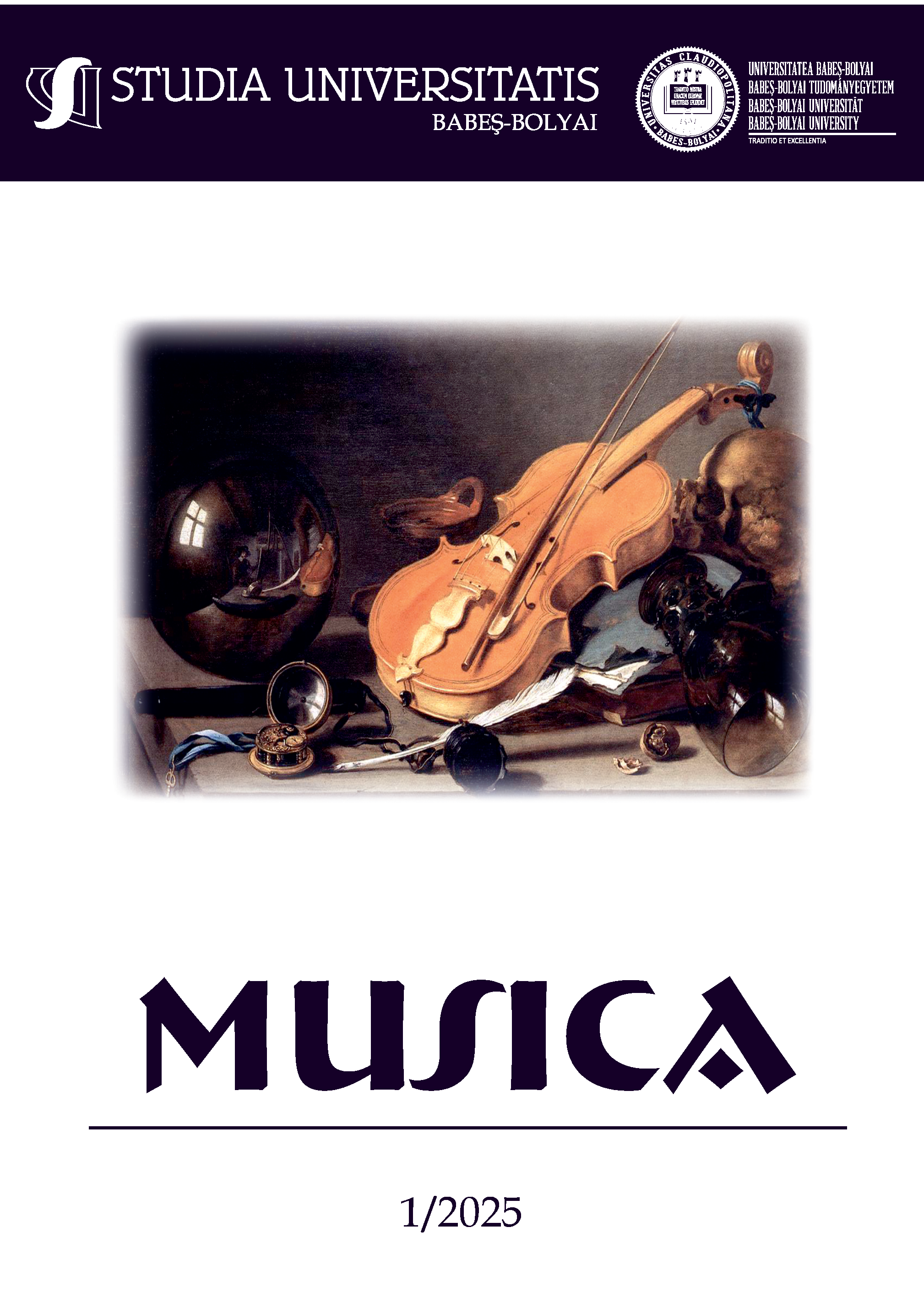A Framework for the Comparative Analysis of Music Theory Textbooks
DOI:
https://doi.org/10.24193/subbmusica.2025.1.06Keywords:
comparative textbook analysis, music theory education, Hungarian music theory textbooksAbstract
This study proposes a novel framework for the comparative analysis of music theory textbooks, with particular focus on harmony instruction in Hungarian secondary-level music education. The research addresses a critical gap in both national and international scholarship: despite the acknowledged pedagogical importance of textbooks, no comprehensive comparative analysis exists that evaluates their structural and didactic dimensions within the discipline of music theory. Drawing from Ágnes Dárdai’s influential work in textbook analysis, the study adapts her comparative methodology to meet the specific demands of music pedagogy. The analysis is structured into three methodological phases: macrostructural examination, microstructural analysis of selected chapters, and evaluation of thematic coherence with particular attention to the treatment of chords borrowed from the parallel minor. This framework contributes to the evolving discourse on textbook theory, curricular alignment, and the role of disciplinary specificity in educational materials.
References
1. Báthory, Zoltán & Falus, István. (Eds.) Pedagógiai Lexikon – III. kötet (Pedagogical Encyclopedia – Volume III). Keraban Könyvkiadó, Budapest, 1997.
2. Bence, Gábor & Gálos, Miklós. Korálelőjátékok az Evangélikus Énekeskönyv énekeihez (Chorale Preludes for the Hymns of the Lutheran Hymnal). Magyarországi Evangélikus Egyház Luther Kiadója, Budapest, 2015.
3. Benedek, András. Oktatáselméleti kérdések a szakképzésben (Theoretical Questions of Education in Vocational Training). Műszaki Könyvkiadó, Budapest, 1995.
4. Boronkay, Antal. (Ed.) Brockhaus Riemann Zenei Lexikon (Brockhaus Riemann Music Encyclopedia). Zeneműkiadó, Budapest, 1984.
5. Dala, Mária. „A tankönyv és hatása (The Textbook and Its Impact).” Tankönyvelméleti tanulmányok, edited by János Tibor Karlovitz, Tankönyvkiadó, Budapest, 1986. pp. 20–49.
6. Dala, Mária. „A tankönyv és hatása (The Textbook and Its Impact).” Tankönyvelméleti tanulmányok, edited by János Tibor Karlovitz, Tankönyvkiadó, Budapest, 1986. pp. 20–49.
7. Dárdai, Ágnes. „Tankönyvelemzési modellek a nemzetközi tankönyvkutatásban (Textbook Analysis Models in International Textbook Research).” In Iskolakultúra, 9(4), 1999. pp. 44–53.
8. Dárdai, Ágnes. „Az összehasonlító tankönyvkutatás nemzetközi tapasztalatai (International Experiences in Comparative Textbook Research).” Educatio, 9(3), 2000. pp. 498–508.
9. Dárdai, Ágnes. A tankönyvkutatás alapjai (Foundations of Textbook Research). Dialóg Campus Kiadó, Budapest, 2002.
10. Diestel, Suse-Marei. „Die internationale Schulbuchverbesserung – Ein Beitrag zur Konfliktforschung (International Textbook Improvement – A Contribution to Conflict Research).” In Beiträge zur Konfliktforschung, 5(1), 1971. pp. 56–100.
11. Frank, Oszkár. Hangzó zeneelmélet (Sounding Music Theory). Rózsavölgyi és Társa, Budapest, 2008.
12. Gárdonyi, Zsolt. Életrajz (Biography). 2020. http://www.gardonyi.de/vita_zsg_ma.html
13. Gárdonyi, Zsolt & Nordhoff, Hubert. Összhang és tonalitás (Harmony and Tonality). Rózsavölgyi és Társa, Budapest, 2012.
14. Győrffy, István; Beischer-Matyó, Tamás & Keresztes, Nóra. Klasszikus összhangzattan (Classical Harmony). Rózsavölgyi és Társa, Budapest, 2009.
15. Johnsen, Einar Broch. Textbooks in the Kaleidoscope. Høgskolen, Oslo, 2001.
16. Kaposi, József. „A tankönyv szerepének változásai (Changes in the Role of the Textbook).” Válogatott tanulmányok II., edited by József Kaposi, Szaktudás Kiadó, Budapest, 2015. pp. 113–132.
17. Kesztler, Lőrinc. Összhangzattan – A klasszikus zene összhangrendjének elmélete (Harmony – The Theory of Classical Music Harmony). Zeneműkiadó, Budapest, 1952.
18. Kéri, Katalin. Bevezetés a neveléstörténeti kutatások módszertanába (Introduction to the Methodology of Educational History Research). Műszaki Könyvkiadó, Budapest, 2001.
19. Ligeti, György. Klasszikus összhangzattan (Classical Harmony). Editio Musica, Budapest, 2014.
20. Ligeti, György. A klasszikus harmóniarend (The Classical Harmonic Order). Editio Musica, Budapest, 2015.
21. Meyers, Ludwig. „Zur Problematik der Analyse von Schulgeschitsbüchern (On the Problems of Analyzing School History Textbooks).” Gesichte, Wissenschaft und Unterricht, 12(1), 1973. pp. 722–739.
22. Nagy, Sándor. Az oktatáselmélet alapkérdései (Fundamental Questions of the Theory of Education). Tankönyvkiadó, Budapest, 1981.
23. Sárosi-Szabó, Márta. „A zenei elméleti tárgyak iskolarendszerű tanításának múltja Magyarországon (The past of school-based teaching of music theory subjects in Hungary).” Zenepedagógiai kutatások – A zeneoktatás megújuló módszertana, edited by Judit Váradi, Debreceni Egyetemi Kiadó, Debrecen, 2019. pp. 139–174.
24. Steinitz, Richard. Ligeti György – A képzelet zenéje (György Ligeti – The Music of Imagination). Editio Musica, Budapest, 2016.
25. Szendi, Ágnes (Ed.) „Frank Oszkár köszöntése közelgő 95. születésnapja alkalmából (Celebrating Oszkár Frank on the Occasion of His Upcoming 95th Birthday).” In Parlando, 59(3), 2017. n.p.
Downloads
Published
How to Cite
Issue
Section
License
Copyright (c) 2025 Studia Universitatis Babeş-Bolyai Musica

This work is licensed under a Creative Commons Attribution-NonCommercial-NoDerivatives 4.0 International License.



